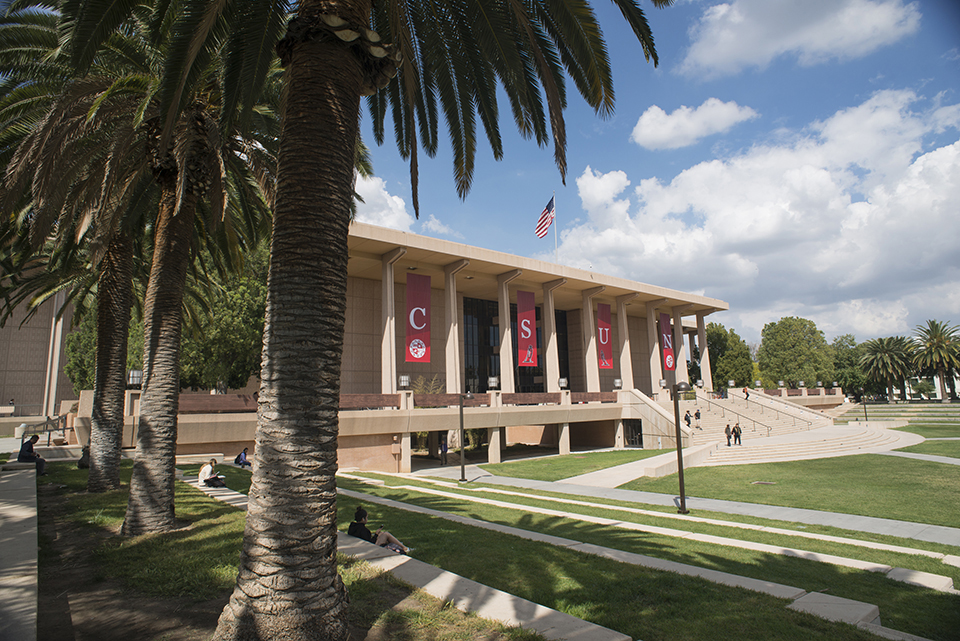CSUN Part of Effort to Create Programs for Students with Intellectual Disabilities

CSUN is one of six CSU campuses sharing a $710,000 grant from the state’s Department of Developmental Services to establish and support inclusive postsecondary education pilot programs for students with intellectual and developmental disabilities. Photo by Lee Choo.
California State University, Northridge is one of six CSU campuses sharing a $710,000 grant from the state’s Department of Developmental Services (DDS) to establish and support inclusive postsecondary education pilot programs for students with intellectual and developmental disabilities.
The money — formally awarded to the Cal State Long Beach Research Foundation — will fund an initiative by the California Inclusive College Alliance to build on or expand programs that can increase the employability and independence of individuals with intellectual and developmental disabilities.
“Our goal is to lay the foundation so that CSUs across the state will have the opportunity to offer similar programs,” said Beth Lasky, a founding member of the alliance and director of the CSUN Explorers program, an inclusive, two-year, postsecondary program offered through Cal State Northridge’s Tseng College.
“People have a lot of misconceptions about what people with intellectual disabilities can or cannot do,” said Lasky, who has been a professor of special education in CSUN’s Michael D. Eisner College of Education for more than 30 years. “Programs like Explorers give people with intellectual and developmental disabilities an opportunity to break down stereotypes about what they are capable of and get a taste of university life, while also getting skills that will expand their employment opportunities.”
CSUN Explorers is designed to increase the independence and work and life skills of students with intellectual and developmental disabilities by offering them an opportunity to experience university life in an age-appropriate setting.
CSUN was the second CSU campus to offer such a program. Fresno State, which is federally funded, launched a similar program, called Wayfinders, in 2011. Since CSUN started its program in 2018, CSU Long Beach and San Francisco State have launched similar programs, Think Beach and Inclusion Project, respectively.
Officials at Northridge, Long Beach and San Francisco will use their share of the DDS grant to bolster and expand their programs, while officials at CSU San Jose, CSU San Marcos and CSU East Bay will use the money to establish similar programs on their campuses. The six campuses are members the California Inclusive College Alliance. The alliance’s membership is open to anyone, including family members and members of the community, interested in inclusive postsecondary education for individuals with intellectual and developmental disabilities.
As part of the grant, each campus has committed to admitting approximately four students with intellectual and developmental disabilities by fall 2023, with the goal of growing in size in subsequent years.
Lasky said CSUN Explorers has served five students since the program started.
“But when the pandemic hit and all our classes went virtual, students and their families found it hard to navigate the new environment,” she said. “Now that things have pretty much returned to normal on campus, I look forward to a resumption of the program and serving even more students.”
To be eligible for the CSUN Explorers program, individuals must have a diagnosed intellectual or developmental disability, be between the ages of 18 and 28, and have a certificate of completion or equivalent from a high school program.
Explorers take two classes each semester with CSUN undergraduate students and have a peer mentor in each class. They also are encouraged to join student clubs and take part in other activities on campus. Their year in the program includes internships on campus or in the community. They also have access to resources in CSUN’s Career Center, including resume writing, to help them find internships and jobs.
Lasky has been pleased with how receptive the university’s faculty have been to having Explorers in their classes.

 experience
experience